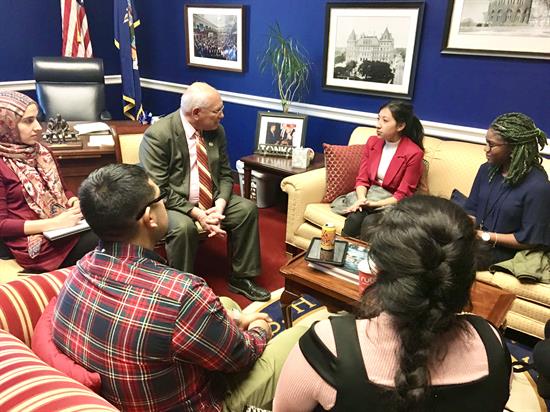- Home
- About
-
Constituent Services
- Academy Nominations
- Community Project Funding
- Congressional Art Competition
- Congressional App Challenge
- Congressional Commendation
- Event Invitation
- Grants
- Help with a Federal Agency
- Internships
- IRA Clean Energy Consumer Benefits
- Know Your Rights: Immigration
- Request a Meeting
- Request Surplus Books
- Presidential Greeting
- Visit Washington D.C.
- Issues & Legislation
- News
- 20th District
- Contact

Press Releases
Tonko Pushes to Advance Major Addiction Treatment Bills at Congressional HearingLongtime champion for addiction treatment highlights MAT Act & Medicaid Reentry Act to confront worsening nationwide opioid epidemic
Washington,
April 14, 2021
Tags:
Addiction & Recovery
WASHINGTON—Congressman Paul D. Tonko made a strong case for Congress to advance two key pieces of addiction treatment legislation today during a Congressional hearing in the Energy & Commerce Subcommittee on Health confronting the nation’s opioid epidemic. Tonko’s bills include the Mainstreaming Addiction Treatment (MAT) Act, which removes pointless barriers preventing medical professionals from providing medication-assisted treatment, and the Medicaid Reentry Act, which empowers states to restore Medicaid coverage—including addiction treatment when needed—for incarcerated individuals up to 30 days before they are released. “These two bipartisan bills are considered some of the most effective policy actions we can take at reducing opioid overdoses,” Tonko said during his brief remarks. “This country is experiencing the highest number of overdose deaths ever recorded in a 12-month period. Americans with substance use disorder are Americans with a treatable disease. We must use all the tools necessary to help this population get connected to treatment and on a road to recovery.” Tonko’s legislative efforts speak directly to alarming estimates from the Centers for Disease Control and Prevention that show more than 87,000 Americans died of drug overdoses during the 12 month period ending September 2020, and hot spot data that show individuals released from incarceration are 129 times more likely to die of a drug overdose during the first two weeks after release. Watch Rep. Tonko’s remarks and questioning of health experts here. Full remarks as prepared for delivery I am a proud sponsor of two pieces of legislation being considered today including the Medicaid Reentry Act and the Mainstreaming Addiction Treatment or MAT Act. These two bipartisan bills are considered some of the most effective policy actions we can take at reducing opioid overdoses. The Medicaid Reentry Act would empower states to restore Medicaid eligibility for incarcerated individuals up to 30 days before their release to ensure those transitioning will have immediate access to critical services including mental health support, addiction treatment and COVID testing. Granting states the ability to jump-start Medicaid coverage for these individuals will mean they are not only able to receive life-saving treatment for mental health, substance use disorders and other conditions, it will also help them stay out of our already overburdened hospitals and on the path to recovery and rebuilding their lives. As ONDCP identifies ways to reduce the increasing number of overdose deaths and to strengthen access to evidence-based SUD treatment services and medications, would passage into law of the Medicaid Reentry Act help to achieve those important goals? I also ask for your commitment to prioritize the elimination of the X-waiver in order to deliver on President Biden’s promise to expand access to medication-assisted treatment. Today I would like to submit a letter for the record signed by groups including the Association for Behavioral Health and Wellness the Kennedy Forum, Shatterproof, Mental Health America, National Association of Attorneys General, National Alliance on Mental Illness, National Council for Behavioral Health and many other groups. They write “The existence of the X-Waiver sends a terrible message to practitioners and the public alike: that treating OUD with buprenorphine requires separate, stigmatizing rules and that buprenorphine is inherently more dangerous than the powerful opioids that have fueled this crisis.” I fully agree that the X-waiver reflects a longstanding stigma around substance use treatment and sends a message to the medical community that they lack the knowledge or ability to effectively treat individuals with substance use disorder. Once again, I urge the Administration to take action to remove the X-waiver and support congressional action with the MAT Act. This country is experiencing the highest number of overdose deaths ever recorded in a 12-month period. Americans with substance use disorder are Americans with a treatable disease. We must use all the tools necessary to help this population get connected to treatment and on a road to recovery.
|
